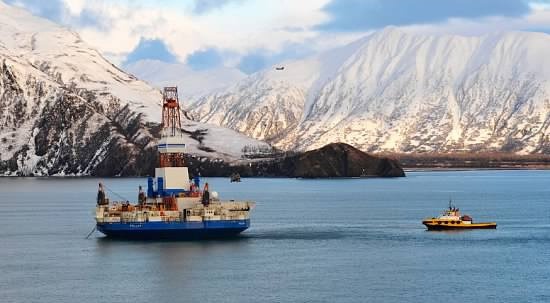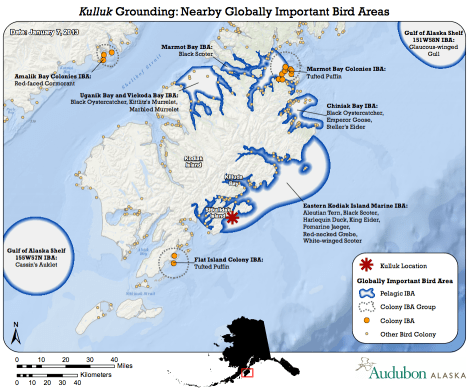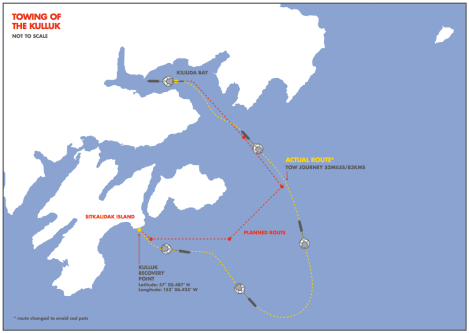We’ll start with the good news: Shell’s Kulluk rig hasn’t spontaneously exploded. It has not escaped the shackles of servitude to roam the Pacific for eternity, earning its keep aboard fishing vessels. Shell has not inadvertently poked a hole in the ocean floor, releasing oil and magma and the souls of the doomed into our atmosphere.
Bearing in mind that none of those horrible things has happened, one quick little update from the highly competent Shell team.
Four survival boats and one rescue boat were dislodged from the Kulluk, either while it was towed or when it grounded on Sitkalidak Island. Each of the survival boats included a 68-gallon capacity diesel tank. Unified Command has been informed that one tank is intact, two tanks have been damaged and one is inaccessible to be able to determine its condition. As such, approximately up to 272 gallons of diesel fuel may have been released from the tanks.
No bigs! Just maybe a few hundred gallons of fuel spilled in the water there. Who’s that going to harm? No one is swimming around out there. It’s not like there are daycares or playgrounds in the middle of the ocean! Any thoughts, Audubon Society?
The Kulluk grounding occurred within a globally significant Important Bird Area where roughly 180,000 seabirds nest and more than 100,000 Black Scoters, White-winged Scoters, Harlequin Ducks, King Eiders, and Red-necked Grebes overwinter. Kiliuda Bay, where the Kulluk is being towed, is still within the same Important Bird Area.
For the sake of comparison, here again is the tow route for the Kulluk. Shell tried to tow it only through the important bird area, but accidentally drove the rig outside of it. Hopefully it at least ran over a few birds in doing so.
For some reason, a coalition of environmental organizations has lost confidence in Shell’s ability to safely drill in the Arctic. (This is not true; they never had any confidence in that ability.) From a letter sent to the secretary of the Interior [PDF]:
[F]ar more ably than its many critics, Shell has proven the folly of Arctic offshore drilling. Suspending Arctic oil and gas activities will provide the time to carefully reassess whether and how offshore drilling in the Arctic Ocean is possible or prudent. Ultimately, we believe that a fact-based and clear-eyed reevaluation that takes into account Shell’s long series of accidents, near-misses, and reversals this year and last year, will lead inescapably to the conclusion that oil drilling in the Arctic Ocean cannot be conducted in a safe and responsible manner.
Here’s what will probably happen: Shell will agree to strict terms under which, if it permanently destroys the entirety of the Earth’s crust and/or converts more than 51 percent of the planet’s ocean water into a crude oil slurry, it will pay a fine of up to 14 cents per gallon sold in the (continental) U.S.
Also, every member of Congress and the Cabinet gets one free fill-up a month at any participating station in the DelMarVa region and a fuel-covered cormorant to hang from the rear-view mirror.






